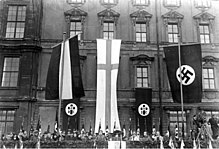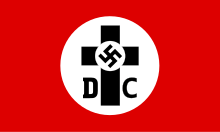
Back مسيحية إيجابية Arabic Cristianisme Positiu Catalan Positives Christentum German Cristianismo positivo Spanish Christianisme positif French Kekristenan Positif ID Cristianesimo positivo Italian 積極的キリスト教 Japanese 긍정적 기독교 Korean Positief christendom Dutch
This article's lead section may be too long. (September 2023) |


Positive Christianity (German: positives Christentum) was a religious movement within Nazi Germany which promoted the belief that the racial purity of the German people should be maintained by mixing racialistic Nazi ideology with either fundamental or significant elements of Nicene Christianity. Adolf Hitler used the term in point 24[a] of the 1920 Nazi Party Platform, stating: "the Party as such represents the viewpoint of Positive Christianity without binding itself to any particular denomination".[3] The Nazi movement had been hostile to Germany's established churches.[4][5] The new Nazi idea of Positive Christianity allayed the fears of Germany's Christian majority by implying that the Nazi movement was not anti-Christian.[6] That said, in 1937, Hans Kerrl, the Reich Minister for Church Affairs, explained that "Positive Christianity" was not "dependent upon the Apostle's Creed", nor was it dependent on "faith in Christ as the son of God", upon which Christianity relied, rather, it was represented by the Nazi Party: "The Führer is the herald of a new revelation", he said.[7] Hitler's public presentation of Positive Christianity as a traditional Christian faith differed. Despite Hitler's insistence on a unified peace with the Christian churches, to accord with Nazi antisemitism, Positive Christianity advocates also sought to distance themselves from the Jewish origins of Christ and the Christian Bible.[4][5] Based on such elements, most of Positive Christianity separated itself from traditional Nicene Christianity and as a result, it is in general considered apostate by all mainstream Trinitarian Christian churches, regardless of whether they are Catholic, Eastern Orthodox, or Protestant.
Hitler consistently self-identified as a Christian in public, and even on occasion as a Catholic, specifically throughout his entire political career, despite criticising biblical figures. He identified himself as a Christian in a 12 April 1922 speech.[8] However, historians, including Ian Kershaw and Laurence Rees, characterise his acceptance of the term "positive Christianity" and his political involvement in religious policy as being driven by opportunism, and a pragmatic recognition of the political importance of the Christian churches in Germany.[6] Nevertheless, efforts by the regime to impose a Nazified "positive Christianity" on a state-controlled German Evangelical Church essentially failed, and it resulted in the formation of the dissident Confessing Church which saw great danger to Germany from the "new religion".[9] The Catholic Church also denounced the creed's ideology that contained idolatry of race, people, the state in the 1937 papal encyclical Mit brennender Sorge.
Official Nazi ideologist Alfred Rosenberg played an important role in the development of "positive Christianity", which he conceived in discord with both Rome and the Protestant churches, whose doctrines he called "negative Christianity".[10] Peculiarly, Eastern Orthodoxy had not been criticised by Rosenberg, and Richard Steigmann-Gall questions whether or not this opposition to Western Christianity made Rosenberg a genuine anti-Christian.[11] Rosenberg conceived of Positive Christianity as a transitional faith to bring Christianity toward Nazi antisemitism and amid the failure of the regime's efforts to control Protestantism through the agency of the pro-Nazi "German Christians", Rosenberg, along with fellow radicals Robert Ley and Baldur von Schirach backed the Neo-Pagan "German Faith Movement", which completely rejected traditional Judeo-Christian conceptions of God from Western thought.[12] During the war, Rosenberg drafted a plan for the future of religion in Germany which would see a Positive Christian Reich influenced by Germanic paganism conduct the "expulsion of the foreign Christian religions", the replacement of the Bible as the supreme religious authority with Mein Kampf as the holy scripture of Positive Christianity, and the replacement of the Christian cross with the swastika as the universal symbol of European Christianity in Nazified Christian churches.[13]
- ^ German Federal Archive, image description via cooperation with Wikimedia Commons
- ^ Michael & Rosen 2007, p. 321.
- ^ "GHDI - Document - Page". ghdi.ghi-dc.org. Retrieved 8 April 2021.
- ^ a b Buesnel, Ryan (April 2020). Denison, Brandi (ed.). "'Positive Christianity': Theological rationales and legacies". Religion Compass. 14 (7). John Wiley & Sons: e12353. doi:10.1111/rec3.12353. ISSN 1749-8171. S2CID 218994700.
- ^ a b Steigmann-Gall, Richard (May 2007). "The Nazis' 'Positive Christianity': a Variety of 'Clerical Fascism'?". Totalitarian Movements and Political Religions. 8 (2: ‘Clerical Fascism’ in Interwar Europe). Taylor & Francis: 315–327. doi:10.1080/14690760701321239. ISSN 1743-9647. S2CID 144640723.
- ^ a b Rees 2012, p. 135.
- ^ Shirer 1960, pp. 238–239.
- ^ Hitler, Adolf. The Speeches of Adolf Hitler, 1921–1941. p. 6. Retrieved 2 January 2019.
- ^ Berben 1975, pp. 139–141.
- ^ "Nuremberg Trial Defendants: Alfred Rosenberg". Jewish Virtual Library. Chevy Chase, Maryland: American–Israeli Cooperative Enterprise. Retrieved 2 January 2019.
- ^ Hexham 2007.
- ^ Aycoberry 1999, p. 191.
- ^ Shirer 1960, p. 240.
Cite error: There are <ref group=lower-alpha> tags or {{efn}} templates on this page, but the references will not show without a {{reflist|group=lower-alpha}} template or {{notelist}} template (see the help page).